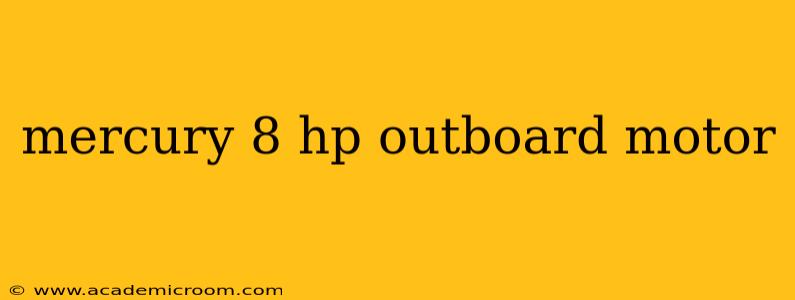The Mercury 8 HP outboard motor is a popular choice for small boats, offering a reliable and powerful performance for a variety of water activities. Whether you're a seasoned boater or a first-time buyer, understanding its features, maintenance, and troubleshooting is crucial for a smooth and enjoyable experience. This guide will delve into everything you need to know about the Mercury 8 HP outboard motor.
What are the Different Models of Mercury 8 HP Outboard Motors?
Mercury has produced several variations of its 8 HP outboard motor over the years. Specific models vary in features, such as the inclusion of electric start, power trim, and different tiller handle configurations. Some models are designed for specific applications, like fishing or inflatables. To determine the exact specifications and features of your motor, it's best to consult your owner's manual or the Mercury Marine website, using your motor's serial number. Looking up the serial number can provide detailed information on the year of manufacture, specific model, and any applicable recalls.
How Much Does a Mercury 8 HP Outboard Motor Cost?
The price of a Mercury 8 HP outboard motor varies depending on the model, condition (new or used), and retailer. New motors will generally be more expensive than used ones. The inclusion of features like electric start or power trim will also impact the overall cost. It's advisable to shop around and compare prices from different authorized Mercury dealers before making a purchase. Checking online marketplaces for used motors might present more budget-friendly options, but thorough inspection and verification of the motor's condition are essential before committing to a purchase.
What is the Fuel Consumption of a Mercury 8 HP Outboard Motor?
Fuel consumption for a Mercury 8 HP outboard motor depends on several factors, including the boat's size and weight, operating conditions (speed, load), and the age and condition of the motor itself. Generally, you can expect relatively economical fuel usage, particularly at lower speeds. However, precise fuel consumption figures can be difficult to pinpoint without specific operating parameters. Consulting the owner's manual for your particular model may provide estimated fuel consumption data, though it's best viewed as a guideline rather than a precise measurement. Proper maintenance and regular tune-ups can help optimize fuel efficiency.
How Do I Troubleshoot a Mercury 8 HP Outboard Motor?
Troubleshooting a Mercury 8 HP outboard motor often requires a systematic approach. Start by checking the basics: fuel supply, spark, and compression. If the motor won't start, ensure there's sufficient fuel in the tank and that the fuel lines are clear and free of obstructions. Check the spark plugs for proper function and replace them if necessary. Low compression can indicate internal engine problems and may require professional servicing. If the engine is running but performing poorly, inspect the carburetor for proper adjustment and cleanliness. For more complex issues, consulting a qualified Mercury outboard mechanic is strongly recommended. Attempting repairs without proper knowledge and tools can cause further damage.
What is the Maintenance Schedule for a Mercury 8 HP Outboard Motor?
Regular maintenance is vital for the longevity and optimal performance of your Mercury 8 HP outboard motor. The specifics of the maintenance schedule can be found in the owner's manual, but generally include tasks like:
- Pre-season Inspection: A thorough check before each boating season is crucial.
- Regular Oil Changes: Follow the recommended oil change intervals specified in your owner's manual.
- Spark Plug Replacement: Replace spark plugs according to the recommended schedule.
- Carburetor Cleaning: Regular cleaning of the carburetor is essential for optimal fuel delivery.
- Lower Unit Lubrication: Maintaining the lower unit lubrication is key to preventing damage.
Following these guidelines will help ensure your Mercury 8 HP outboard motor runs smoothly and reliably for many years to come. Remember, proper maintenance is an investment that pays off in extended engine life and fewer costly repairs.
